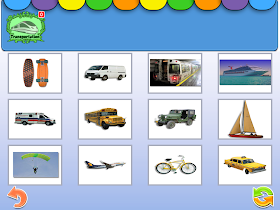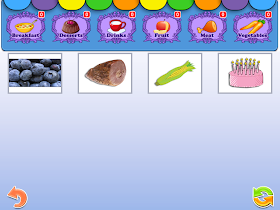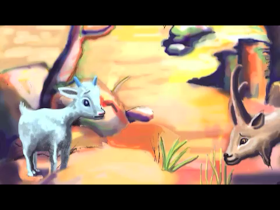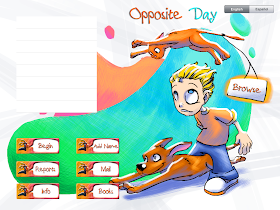Category Carousel:
This app addresses exactly what it says! Categories! Using cute graphics, this easy to use app allow students to verbally express and sort pictures into categories. They are provided with verbal prompts as they touch the various pictures. There are two ways to play, sort by category or into subcategories. For example, if you want students to sort by season, touch "summer" and "winter" then press "begin."
To sort by subcategories, press a category such as "transportation" and then click begin. Students can drag all or some of the pictures toward the "transportation" logo up top.
Once completed, click the "transportation" logo and students will be provided with subcategories to sort into using the pictures they dragged into there.
Subcategories of food:
Categories
and subcategories found within:
Animals
(birds, bugs, farm, water, jungle, forest)
Transportation (land, water, sky)
Clothing (body, head, feet)
Food (breakfast, deserts, drinks, meat, fruit, vegetables)
Household (cleaning, furniture, toys, tools, bathroom, kitchen)
Instruments
Occupations
Summer
Winter
Reinforcement: Students are rewarded with a cheering sound and a rewarding graphic.Transportation (land, water, sky)
Clothing (body, head, feet)
Food (breakfast, deserts, drinks, meat, fruit, vegetables)
Household (cleaning, furniture, toys, tools, bathroom, kitchen)
Instruments
Occupations
Summer
Winter
You can choose to play again or "go back."
Things I like about this app:
- Easy to use and navigate
- Common categories used
- Works on more abstract concepts with subcategories
- Can stop at any time
- Students are rewarded and prompted when incorrect
- Pictures are easy to decipher what they are supposed to be
- Score keeping/data collection
- Use with multi-players for group therapy
- Reduction in price. Some might find $9.99 too much to spend on one app.
iBook: Billy Goats Gruff:
Pocket SLP created a brand new app that is run through iBooks. They took the classic Billy Goats Gruff story and provided it in a storybook and video form.
Speech goals this app can address:
-comparatives/superlatives-adjectives
-sequencing/transition words (first, second, third, next, last)
-auditory comprehension
-character traits
-cause/effect
-predicting
Since this iBook was designed for SLPs, they created follow-up activities targeting auditory comprehension!
Yes/No Coloring: Students listen to a question and must recall details from the story. They are then prompted to click "yes" or "no." By responding correctly they are rewarded with watching a picture from the story get colored.
Follow the clues: Students touch the numbers to hear clues. How many clues will it take them to guess the vocabulary word from the story? Once they have touched all the numbers, they will be able to touch the circle in the middle to review the mystery word.
Story Retell: Students touch a picture at a time to prompt them to retell the story in their own words. They are provided with a verbal cue with transition words that were also used in the story with those pictures. As they are retelling story, the next picture will be provided for them to continue. This continues until they retell the whole story. They are not marking correct/incorrect so yo must provide them reinforcement/assistance if incorrect.
Auditory Discrimination: Students are provided with the following prompt "listen up touch the picture that says ____." They are provided with words from the story. They are then provided with four pictures (and the names of pictures are provided) and then they are reminded of the word they are looking for. Students must listen, retain the word, and recall it and follow the direction. In some cases, rhyming words are provided as the other choices. They are reinforced if correct and provided with assistance, chance to correct themselves if incorrect. They can advocate for themselves by clicking "hear again."
Things I like about this iBook app:
- Designed for SLPs with auditory comprehension in mind
- Took classic story and created a fun and motivating activity
- Targets numerous speech and language goals
- Easy to use and navigate
- Can easily quit and jump around if necessary
- Motivating for students
- Score keeping/data collection feature
- For story retell: allow for recording of student responses on the app for playback and self correction/reflection
- Reduction in price. $6.99 is a lot for an iBook although you are also getting four games with it.
Opposite Day:
Once all selected, you can hit "begin." It splits between students and activities on own or in order depending on settings.
Now to "study": Students are previewing the different opposites based on the settings.
Then you can start the quiz:
Expressive: Students are providing a verbal prompt to say the opposite. They can score or you can score for them by clicking the green and red buttons. This is great for discussion and self-correction.
Receptive: Students are prompted to touch named opposite. They can click the appropriate button below. If correct they are rewarded with a graphic. If incorrect they can keep going or correct it. It provides time so you can discuss why correct and incorrect.
If they need help, they can request or click the "hint" button which shows them a visual:
Now onto my favorite part, the reports/data collection. You can click "reports" at any time and get scores and email it to yourself.The scores are split by receptive and expressive and by students. The scores are very detailed and helpful. If you click "done" in reports it brings you back to the home page. You can access the reports from the home page as well.
Another button on the home page is "books" this prompts you to the "pocket lexi" app which has some books related to opposites.
Things I like about this app:
- score keeping/email of data
- multi-user and individualized program per student
- receptive and expressive feature
- benefits ESL students
- self correction and time for discussion
- "study" feature to introduce
- easy to navigate and use
- created with SLPs in mind!
- Way to see how many trials were completed on the "quiz"
- Way to select specific vocabulary within categories selected
Have any of these apps?? Let me know what you think!! The developesr promised to provides codes for giveaways. Waiting to hear back from them to find out for which app and how many. Feel free to begin entering and I will update the rafflecopter once I know more information! Good luck!


























I teach categories in our classroom for students with cognitive impairments based on the teacher's current theme. We do a lot of hands on manipulation of pictures or movement activities to engage the students.
ReplyDeletePlay Hot Potato game and name items from categories as we toss the potato back and forth. The kids love it!!
ReplyDeleteI use picture and real objects.
ReplyDeleteFor early opposites with little ones I have a couple of fun/cute books (lift the flap/pull the tab type).
ReplyDeleteI use opposite books, picture matching games, and we also use Hot Potato to teach opposites. For categories we play Category Canyon.
ReplyDeleteI use books, pocket charts and pictures, and sometimes I will have the students act out opposites (up/down, front/back, in/out). I like doing category sort sand playing descriptive dice to work on categories.
ReplyDeleteFor categories I like to cut and paste specific objects and place them in categories. My preschoolers LOVE cut and glue activities, that's why I make so many of them. :)
ReplyDeleteMy kiddos like to 'help' their session buddies. One way we do this is by letting them pick the category for their buddy to answer. We also do a version of hot potato, round robin style. We toss the bean bag and name an item in the given category. The person who gets stuck becomes the referee and the game continues until we have a winner.
ReplyDeleteI use lots of hands on manipulatives in addition to 2-D pictures.
ReplyDeleteI have Super Duper's Early Category magnetic sort board. Students love turning over the pictures and sorting them on the magnetic board.
ReplyDeleteI use books, toys and flashcards.
ReplyDeleteI have many "hot potato" like games that I use for categories. The kids have to say a member of the category before they pass it on. Pass the pickle and my Rudolph the Red Nosed Reindeer are always favorites!
ReplyDelete